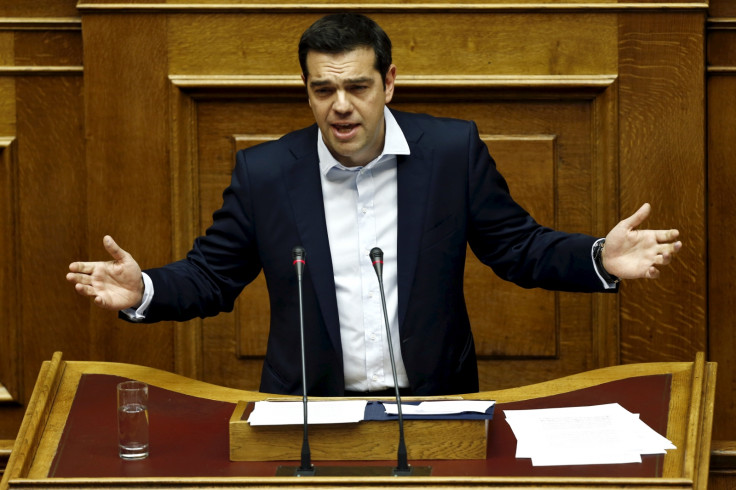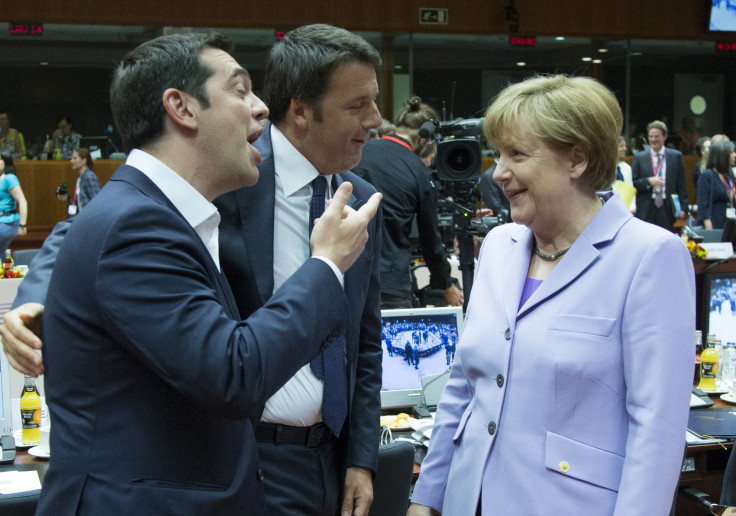Greek debt crisis: Does Alexis Tsipras realise Greece is not the only democracy in the eurozone?

You might think Greece is the sole democracy in the eurozone if you only listened to the likes of Prime Minister Alexis Tsipras, (former) Finance Minister Yanis Varoufakis, and their hordes of far-left fans across Europe.
"Greece has proved that democracy cannot be blackmailed," Tsipras told his people in a television address after the referendum result in which Greeks voted against bailout conditions proposed by the troika.
Tsipras's decision to leave the negotiating table and call a snap referendum was a symptom of all round political failure.
"Today, we celebrate a victory of democracy, and tomorrow, together, we will continue a national effort to exit this crisis with a belief in the power of the people."
Greece is one of nineteen democracies in the eurozone. The views of its government and people must be taken into account like every other member. But it is not unique.
The Greek people have spoken and the status quo is intolerable to most of them. They have struggled on for several years in the wreckage of a crash caused for the most part by others. Their incomes have plummeted. Unemployment is rife. Their cost of living has rocketed.
It is understandable that out of frustration and desperation they would reject in general the position of their European creditors - that of deeper austerity and tough fiscal targets in exchange for another bailout for bankrupt Greece - and reject it by such a wide margin in a referendum.
Though, you would be hard-pressed to find an electorate willing to vote for higher taxes.

But if it is more direct democracy Tsipras and Syriza want then they should be careful what they wish for. Eurozone states are representative democracies.
They elect politicians to represent them and their best interests. To understand, explore and debate complex and vital issues.
At the moment, none is more vital than a resolution to the Greece crisis in Europe. That resolution has to be structural reform of the Greek economy in return for debt restructuring.
This is easy to write and believe, but much harder to agree to around a negotiating table which seats competing interests and democratic mandates. What if you are a German politician like Angela Merkel?
Merkel, like Tsipras, has a mandate to represent the best interests of her electorate. She may make decisions they dislike, or find problematic, but she is working towards a solution that she believes is in their best interests - as Tsipras is doing for Greek citizens.
Rather than stay at the table and keep negotiating, Tsipras decided to go directly to his electorate when the talks reached their nadir. For all his spiel about being blackmailed, a referendum was the biggest piece of blackmail he could have levelled at the Eurogroup.
This is because he knew he could win it, and win it convincingly, by cranking up the rhetoric and populism against the rest of the Eurogroup, and Germans in particular.
Syriza supporters have, to their shame, compared Merkel and the German government to Nazis. Tsipras made a lazy, aggressive and deeply political move.
What if Merkel were to play the same game? What if Merkel went to the German electorate and asked them whether or not she should accept the Greek government's request for debt relief?
From a report on ekathimerini.com:
More than half of Germans believe debt-stricken Greece should leave the eurozone, according to a poll published on Friday amid a war of words between Athens and Berlin.
And 80% believed Greece is not acting in a reliable manner in its negotiations with eurozone partners, found the Politbarometer survey released by public broadcaster ZDF.
The proportion of respondents who think Greece should stay in the currency union has fallen to 40% from 52% two weeks ago, while 52% now believe it should leave, up from 41%.
You can probably guess how the Germans would have voted. And that would give Merkel an explicit mandate - an obligation, even - to turn around to her Greek counterparts and say "sorry, but this is not what the German people want and democracy must triumph".
It is obvious to reasonable people that direct democracy is problematic and should be used sparingly, such as on constitutional issues or the prospect of ceding sovereignty to another power.
But on complex technical issues, such as the economic and financial crisis in Greece, representative democracy should serve people far better.
Tsipras and Syriza won their mandate back in January 2015 to take a tougher stance at the negotiating table with the Eurogroup.

They, their advisers and their negotiators know the complexities and the issues far better than most of the population ever will. So is it reasonable to ask the people, over a course of just a few days, to take a decision about which most will only have a layperson's understanding?
Greece is part of a broader system, the eurozone, in which compromise has to be reached for the benefit of as many members as possible.
Tsipras's decision to leave the negotiating table and call a snap referendum was a symptom of all round political failure.
But he is not any more 'democratic' by doing so. Every politician in the Eurogroup has already won a mandate from their electorate and they will soon have to answer for their performances again.
If Greece gets a debt haircut, it will be German and French banks which take a lot of the hit because of their vast exposure to Greek debt. When these banks suffer losses, the German and French people will also be hit. Higher interest rates and tighter credit conditions will stifle lending to the real economy. The politicians will then have to answer to these people.
There is no easy answer in which everyone is happy. This is a classic scenario where the least-worst option should be taken. Neither side should hold the other to ransom and it is fair to say there has been, at times, pig-headedness all round.

Ultimately, the Greek crisis is about much more than the bankruptcy of one country. It is about what the eurozone is and should be.
The eurozone's biggest flaw is exposed more than ever -- the lack of fiscal union. If the eurozone were fiscally integrated, the transfers from Germany to Greece would be seen as a natural consequence of being a part of the currency union. Indeed, integral to the currency union's survival and credibility.
Of course Germans would help Greeks, because above all they are members of the eurozone, which means collaboration and sharing.
But the eurozone does not yet work like that and so individual member states are, by design, pitted against one another. So the collective good is often put to one side in favour of that of the individual member state. This has been as true of Germany as it has of Greece.
This fundamental problem has to be resolved and resolved quickly. It will mean asking difficult questions. Perhaps not every current member state would want to be part of a politically and fiscally integrated currency union - a United States of the Eurozone. In which case they should leave and allow the others to integrate and create a sustainable future for the euro.
At the moment, the eurozone is in purgatory. And it will remain there even if the Greek crisis is solved.
© Copyright IBTimes 2025. All rights reserved.





















